How to Save Money on Your Wedding: The Ultimate Cost-Cutting Guide

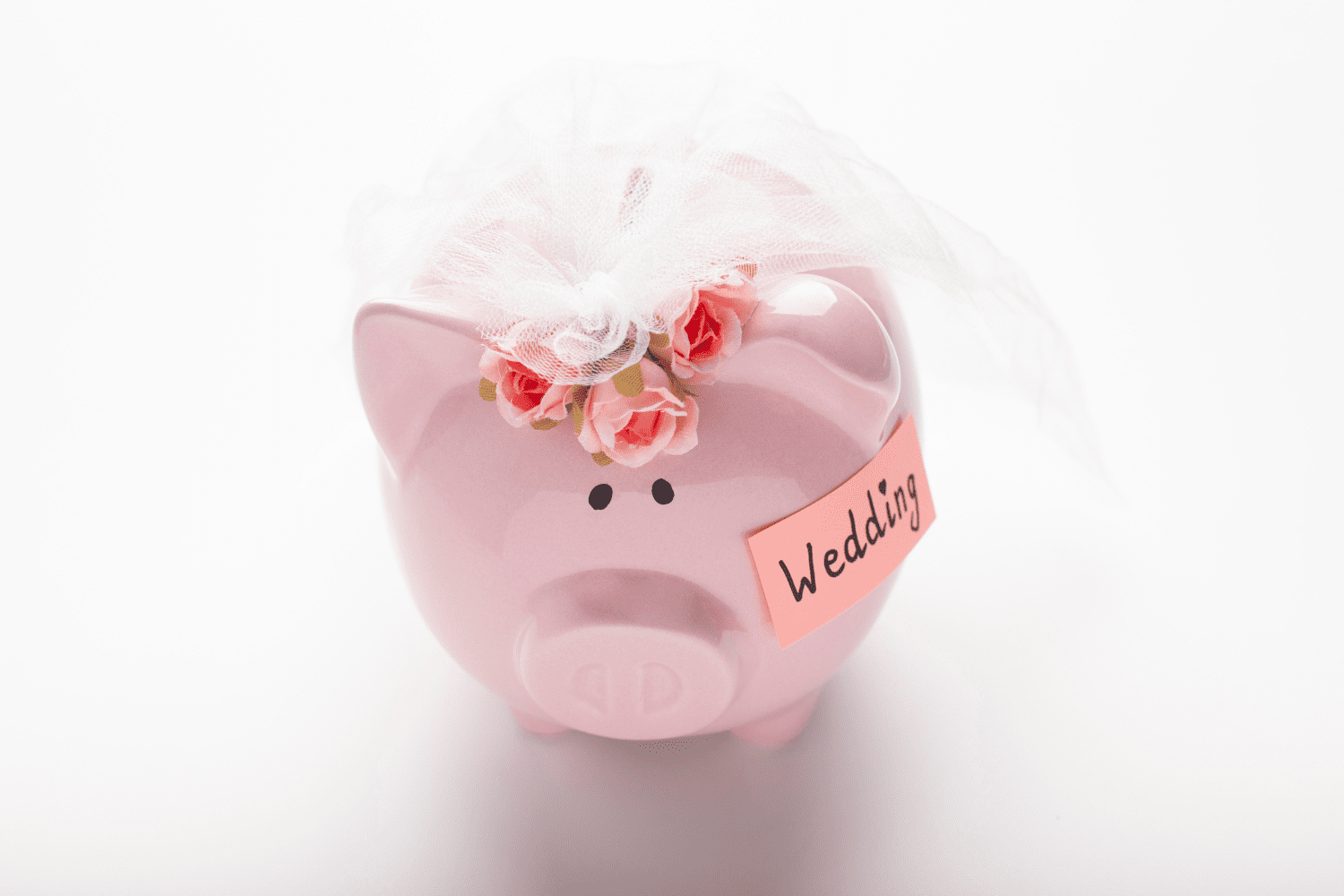
Whether you’ve recently started to plan your wedding or you’re right in the thick of it, you probably noticed something fairly quickly – weddings can be costly. In 2026, the average cost of a wedding is £20,604, and that’s before you’ve even got to the honeymoon or considered the cost of the engagement ring. So if you’re trying to figure out how to plan your dream wedding and stay firmly within your budget, you’ve come to the right place.
In this post, we’re going to take a deep dive into how to save money on a wedding and offer you plenty of tips to make sure you don’t go over your wedding budget.
Before you start planning
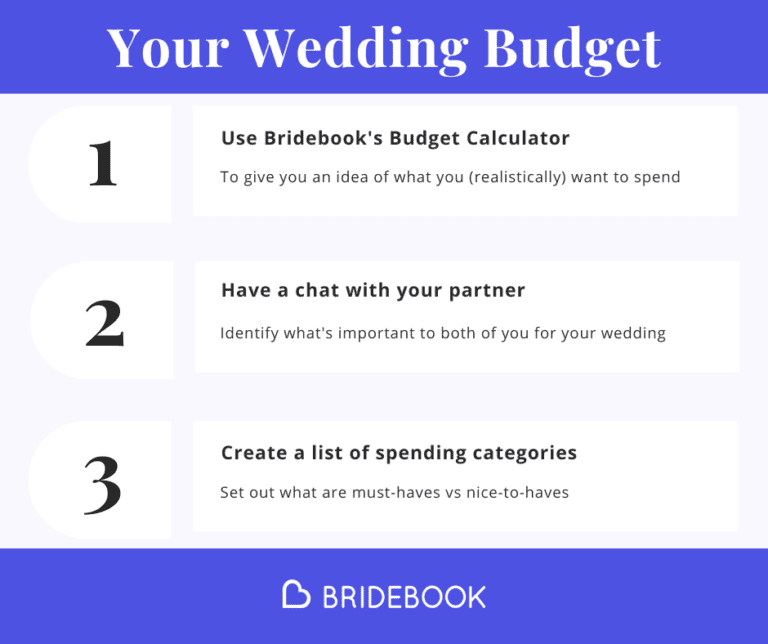
Before we go over the many ways you can save money on your wedding, make sure you have a solid idea as to what you want to (realistically) spend. To give you a helping hand, you can use Bridebook’s useful wedding budget calculator.
Throwing a lavish and expensive wedding is a fabulous way to spend your big day, but it’s important not to get too carried away. Have a chat with your partner about what’s really important for both of you and create a list that categorises the must-haves and the nice-to-haves so you know what can be cut if you get a little too close to the top end of your budget.
Planning a wedding is a lot of fun, but it can also be a stressful time. That stress, combined with spending a great deal of money, can be create challenges. Remember to be open and honest with your partner and try not to get your heart set on something before you’ve booked it. The last thing you want is to be disappointed if something doesn’t quite work out how you hoped.
What’s the average cost of a wedding in 2026?
As uncovered in our ultimate wedding budget breakdown, the average cost of a wedding in 2026 is £20,604, not including the ring and a potential honeymoon. When you factor the engagement ring and honeymoon into your budget, the average cost rises to £25,815, which is a huge amount of money to spend.
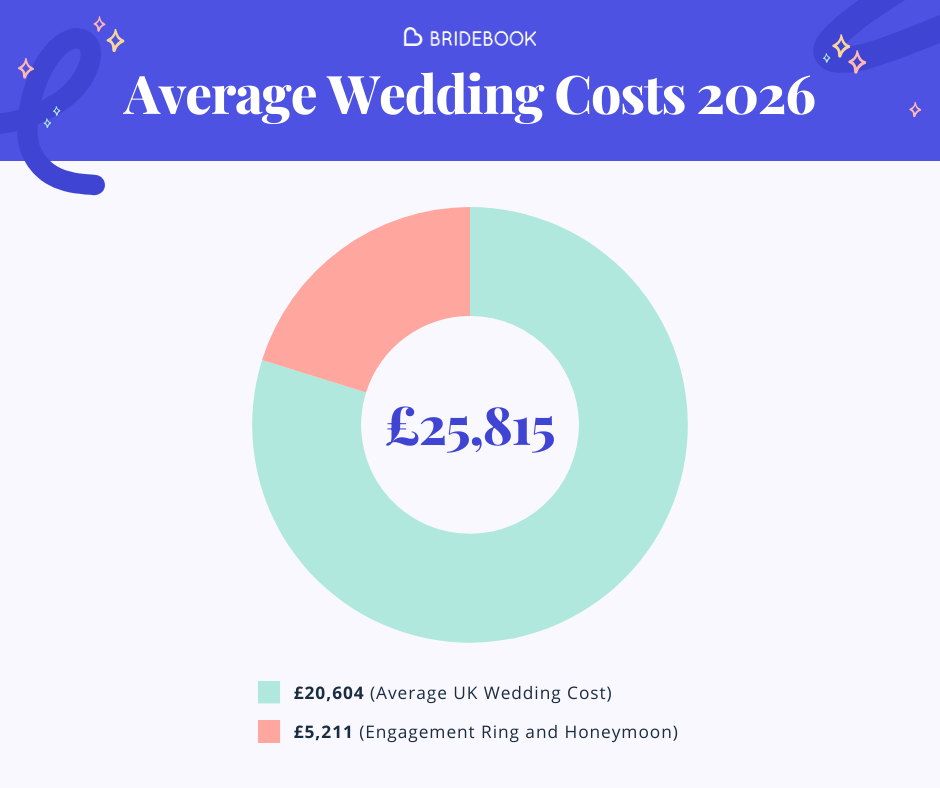
It’s important to remember that this is just an average, and the actual cost of your wedding will depend on many factors, including the cost of the venue, number of guests, time of year, and even how many tiers there are on your cake.
Of course, you don’t have to spend this amount, or anything close to it – couples have weddings which range from costing less than £1,000 to costing £100,000 or more. If you budget wisely, make some careful decisions and plan ahead, you can make significant savings while still ensuring you have your dream wedding.
What are the best tools for saving money on your wedding?
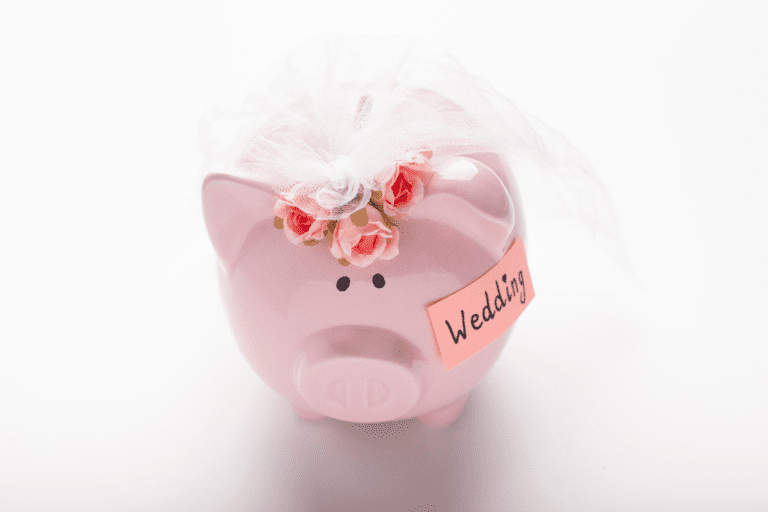
When the time comes to start planning your wedding in earnest, the excitement can take hold and before you know it you’re creating spreadsheets, browsing Instagram hashtags and Pinterest stores, and your Google search history is nothing but venues and flower shops. But before you dive into the deep end, why not consider a tool to help you save time, money and effort?
We recommend using Bridebook’s state-of-the-art wedding budget tool to keep track of your expenses and make sure everything is taken care of. We also have a wedding planning app so you don’t have to keep a stack of notebooks with you or carry your laptop around when you meet vendors – you’ll have everything you need right there on your phone.
Can you save money on your wedding by inviting fewer guests?
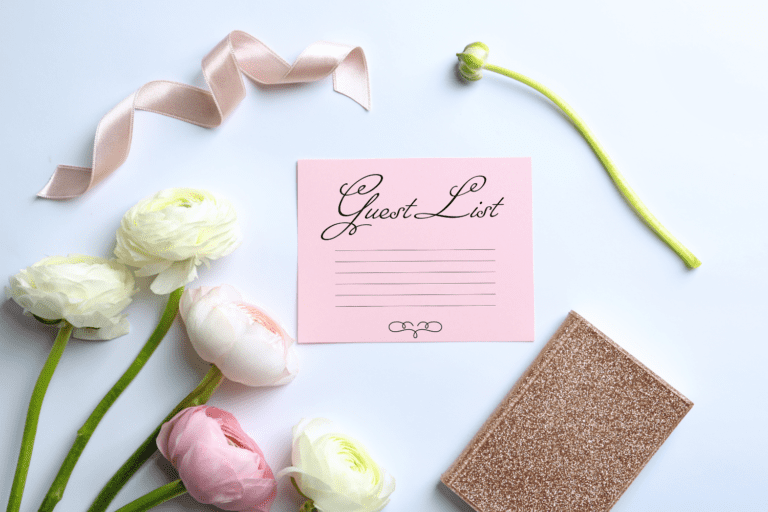
When you’re getting married, we understand that it’s a big deal and you’ll probably want to invite every family member, friend, colleague and acquaintance you have. However, having a set number of guests will ensure you keep the guest list limited, which will save you on the venue, catering and invitation costs. It may be tempting to invite everyone you know to come and celebrate with you, but doing so will increase the cost of your wedding and could push it beyond your budget.
To put it into perspective, the average couple spends around £155 per guest – that means, if you’re ruthless with your guest list and invite 100 guests instead of 150, you’ll save over £7,750. If you’re not prepared to make cuts quite that drastic, even just cutting back your guest list by five could save you around £775.
Is it cheaper to have a twilight wedding?

A twilight wedding is a wedding that starts later in the day and is a great way to lower the cost of your wedding. It not only means you’re using your venue for a shorter amount of time, but you also bypass the expensive wedding breakfast and you pay vendors and staff for fewer hours as well.
For example, Friern Manor Country House Hotel offers a twilight wedding package starting at £2,950 for 60 guests, compared to £5,995 for a traditional wedding – that’s half the price! That means you can have all the celebrations of every other wedding, only condensed into a shorter amount of time. It’s the perfect way to make massive savings on your wedding if you’re happy to have the ceremony take place later in the day.
The expert wedding budget video course: DIYs and money-saving tips
If you’re planning a wedding on a budget or just looking to save a bit of cash, knowing how to break down your budget will be one of the most important parts of your overall wedding planning, but how to stick to it? In this video course, Bridebook founder (and qualified wedding planner) Hamish Shephard explains how to plan a wedding on a budget, sharing his expert money-saving tips on everything from your wedding venue to your catering and more.
How can you save money on a wedding venue?
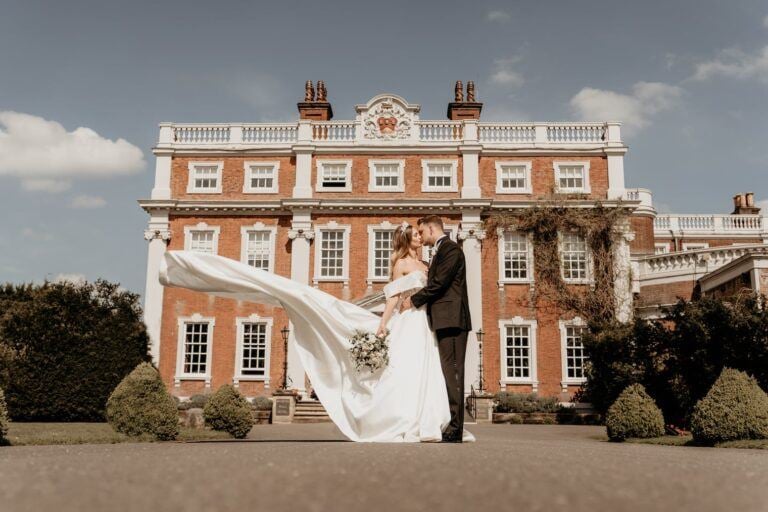
The average cost of a wedding venue in the UK is £6,040 and accounts for around a third of the overall budget for the typical wedding.
If you haven’t set the date yet, you can find huge savings by avoiding the busy seasons, certain days of the week and popular locations. So, if you’re happy to not have a Saturday wedding in the middle of summer, slap bang in the middle of London, you could save thousands. For example:
- Choose a midweek wedding. You’ll save on almost every wedding supplier by joining the 53% of couples who hold their big day on any day other than a Saturday, which is the most popular day to get married. To maximise your savings, the cheapest day to get married is a Tuesday. Suppliers are usually happy to offer reduced rates on days that otherwise wouldn’t be booked.
- Consider areas outside London. Couples are now spending an extra £6,000+ (or 30%) more than the UK average to marry in the capital. So, like other savvy couples, why not consider having your wedding somewhere outside of the capital? North West England and the East Midlands are the cheapest regions to get married in. Plus, not only is a wedding away from your hometown a great way to save money, it increases the feeling of magic, mystery and adventure.
- Have a winter wedding. Try to avoid peak wedding season, which is between June and September, when costs are the highest. Costs are lowest in the winter, with January and February being the cheapest months in which to tie the knot (46% and 15% less respectively than the UK average). So, if you don’t mind it being cold outside, it could be a great choice. And on the off-chance there’s frost or snow, it’ll give you the opportunity to take unique wedding photos.
- Choose an all-in-one venue (with in-house food and drink). You can save a lot by booking an all-in-one wedding venue that includes food and drink versus one that offers separate venue hire and catering options. Some of our most popular all-in-one venues include The Wasing Park in Reading, Tunnels Beaches in Devon, and Blakelands Country House & Barns in Bobbington.
It’s also worth bearing in mind that many venues offer discounts and special ‘late availability’ packages in off-peak wedding seasons or to fill a space left by a cancellation. This can make even the most premium ones a far more affordable option if you’re happy with a bit of last-minute planning and organising. A great example is Holdsworth House Hotel, an idyllic wedding venue with 32 bedrooms, charming courtyards and enchanting gardens.
For more money-saving ideas when it comes to venues specifically, check out our blog post on how to save money on your wedding venue.
How can you save money on your wedding catering?
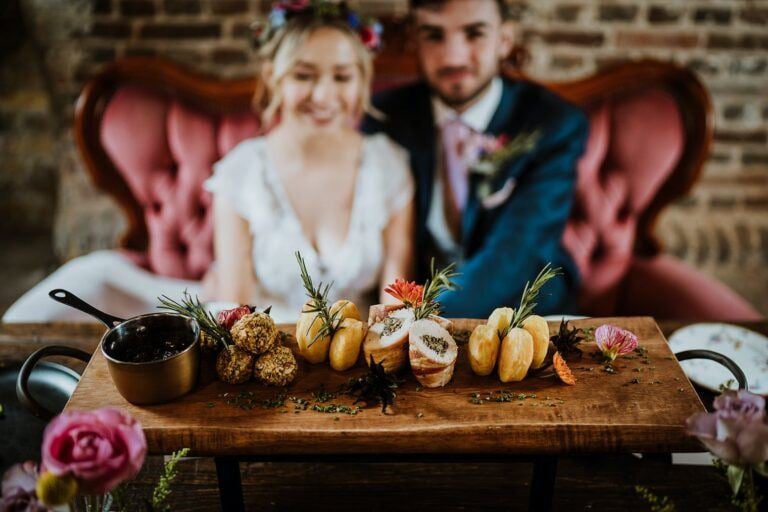
If there’s one thing people remember about weddings, it’s the quality (and quantity) of the food. Whether you go for a four-course breakfast or an all-you-can-eat buffet featuring around-the-world cuisine, food is guaranteed to excite your guests. For that reason, you won’t want to cut corners when it comes to your food, but there are still some creative ways to save money while not compromising on quality. But, with couples spending around £7,408 on wedding catering, it can account for around a third of your entire wedding budget.
As we’ve already highlighted, you can slash these costs by cutting the number of guests you invite, as there will be fewer mouths to feed. Your friend’s boyfriend of two months? Sure, you like them, but do you like them enough to pay £82 per head for them to eat a three-course meal? Cutting out a table of eight will save an average of almost £656 on food and drink (as well as saving you in table numbers and stationery). Not to mention that cutting your guest list might also give you the ability to choose a smaller, more affordable wedding venue.
If you’re keen on having a lot of people there, why not invite them to the evening reception? That way, no one will get offended about not being invited, and you’ll save money by not having to feed as many guests at the wedding breakfast. Alternatively, why not skip the expensive wedding breakfast altogether and have a breakfast buffet instead? A buffet drastically reduces costs by only requiring limited staff, plus it offers guests a wider choice.
For more information on catering costs and savings, check out our post on how to save money on wedding catering.
How can you save money on wedding alcohol?
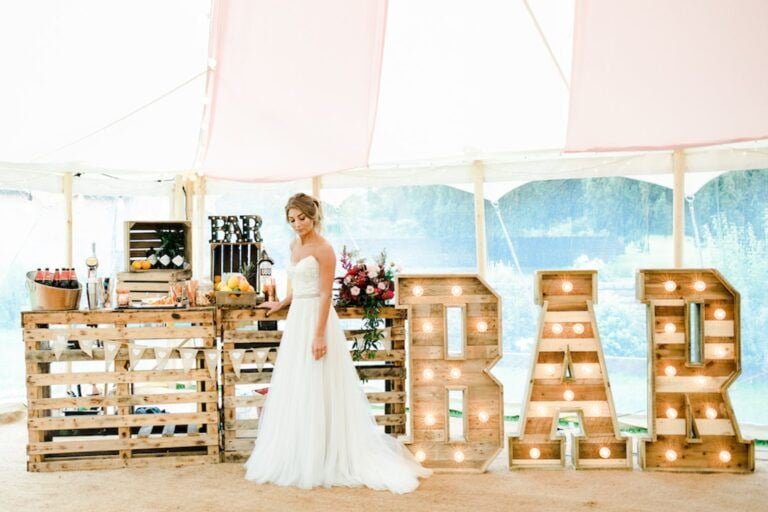
Many people enjoy a drink or two at a wedding, and the most obvious way to save money is by not offering an open bar. Save over £2,000 by offering a paid bar. This requires your guests to pay for their drinks themselves, and stops everyone from accidentally over-indulging.
Another way to save money is by choosing a more affordable fizz for the toasts. Champagne may be a luxurious choice, but cheaper alternatives like prosecco, sparkling wine or Cava will still go down just as well.
You may also be able to hire your own mobile bar instead of going with what the venue offers. One of our vendors, Near and Far Mobile Bar Ltd, is an excellent option as they set up their mobile bar at the venue, provide staff and bartending service, and offer pre-wedding consultation. Whoever you hire, just make sure they have a license. Or, you could choose to provide your own bubbly. Just bear in mind that the venue may charge a corkage fee. This can sometimes be more expensive than going with what the venue offers.
See our post on how to save money on wedding alcohol for more information.
How can you save money on wedding photography?
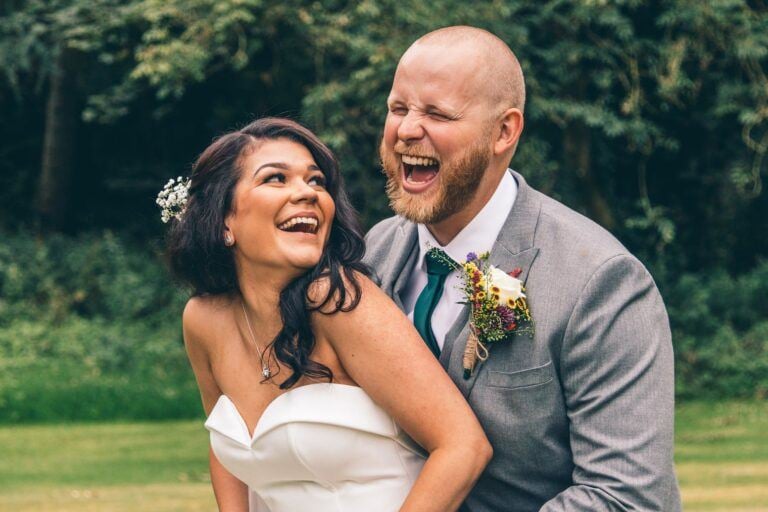
A wedding photographer is a non-negotiable for many couples (9 out of 10 couples choose to hire one) and with the average cost being around £1,484, finding ways to save money on a photographer is always a huge bonus.
Below are just a few tips for helping strip those costs right back, while still ensuring you get wonderful professional photographs.
- Consider an express package. Instead of having the photographer spend the whole day with you, ask if they offer two or three-hour packages, where they come and take shots of the venue, the bridal party and your close friends and family. Opting for fewer hours is the best way to reduce costs, but does mean forgoing pictures of you cutting the cake and your first dance at the evening reception. Some photographers also provide a second camera person and opting out of this service can significantly lower the cost.
- Hire a local photographer. Local photographers will usually charge you far less than those who have to travel far and charge additional fees for those miles. Here at Bridebook, we have a huge range of fantastic photographers, so you’re sure to find one who operates where you’re hosting your wedding.
- Go digital. If you forgo professionally printed albums you could save £250+. Most modern photography packages include a link to your own online gallery, where you can browse and enjoy all your favourite shots at your leisure. You can then always use a photo-developing service, such as Snapfish, to print your photographs for a fraction of the cost later on.
How can you save money on wedding videography?
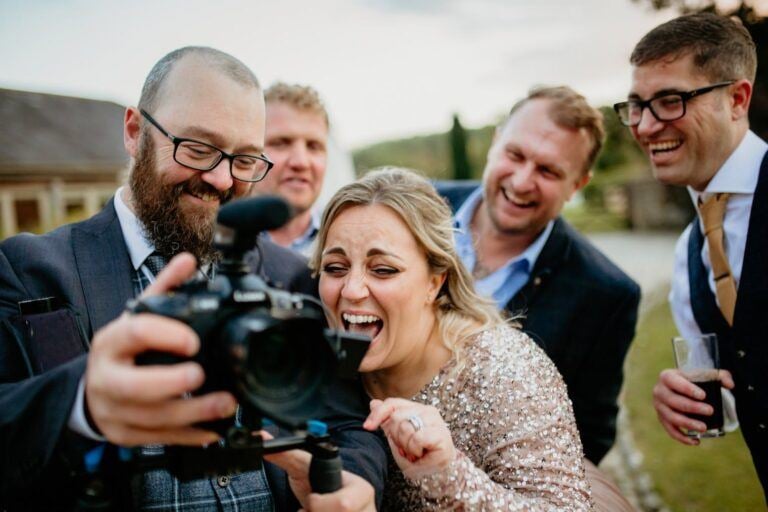
While the majority of couples choose to have a photographer shoot at their wedding, a third of couples also choose to hire a videographer to document and capture their big day in a candid and natural way, with the costs in line with that of a photographer. If capturing your wedding on video is important to you, there are plenty of ways to save money on a videographer too.
One way to save money on a wedding videographer is by hiring a professional who might not have as much experience as others. An up-and-coming videographer, who is new to the business, will have plenty of enthusiasm and passion, but not quite as much of a portfolio. They may also not have a range of expensive kit, such as drones or 4K cameras, but should still be able to produce a beautiful video for a price that fits within your budget.
You may also be able to save money by asking not to have any complex editing or cinematography, which can add a lot of time to post-production.
How can you save money on your wedding flowers?
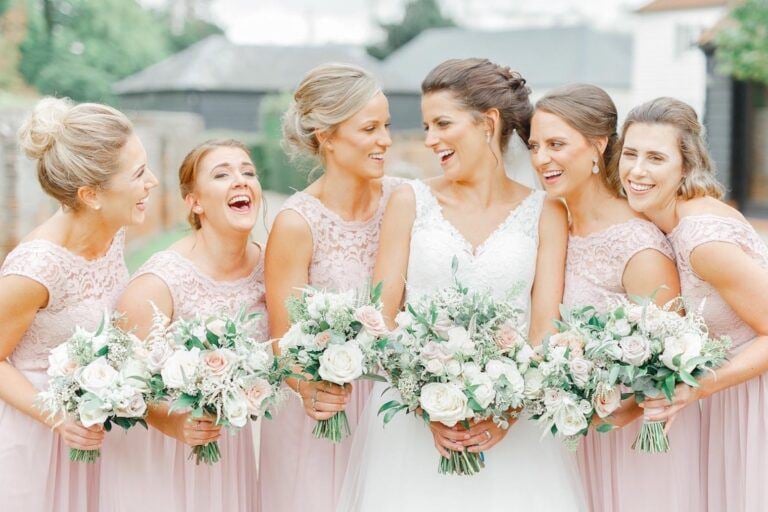
One of the expenses that might take you by surprise is the price of your wedding flowers, at an average cost of around £1,187. This is due to florists having to source different flowers, create elaborate artistic displays, and transport them to the venue, which all requires time, dedication, skill and expertise. That being said, there are ways you can save money on wedding flowers which mean you can have a luscious wedding filled with flora while sticking within your budget.
Many wedding florists have years, if not decades, of experience providing flowers for hundreds of weddings. That means they’re equipped to work with any budget – including yours. Speak to your chosen florist, tell them what you’re looking for and trust them. As with all wedding vendors, communication is key.
Here are a few money-saving tips for choosing wedding flowers:
- Choose flowers with big heads. Not only do they look gorgeous, but generally, the bigger the flowerhead, the fewer stems you need to fill out an arrangement, which can cost a lot less than having multiple small-headed flowers.
- Go for flowers that are in season. While it may be tempting to ask for roses at your spring wedding, they’ll cost a lot more then than they would during late summer or autumn, because they wouldn’t be in season. Choosing flowers that are in season will naturally help keep costs down.
- Choose a naturally beautiful venue. Go for an outdoor wedding with plenty of surrounding greenery, so you won’t have to pay for additional decor. Great outdoor venues can include vineyards, parks and private gardens.
- Opt for foliage over flowers. Greenery is super popular right now and many couples prefer to go with garlands to adorn their tables or drape over the altar. The best part is, foliage is typically way more affordable.
How can you save money on wedding decor and a marquee?
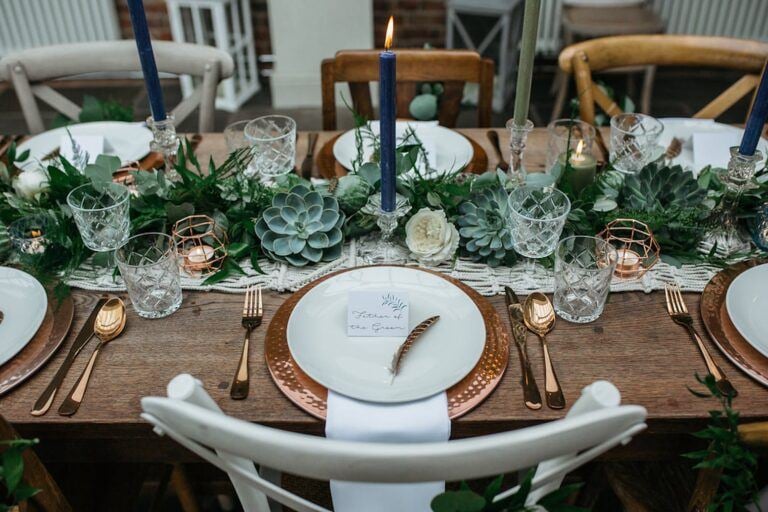
Wedding decor peppers your personality across your big day, but depending on your theme, the costs can quickly add up. The average cost of professionally sourced wedding decor is £1,404, but there are plenty of ways to save money if you’re willing to compromise, such as by creating DIY decorations or sourcing them from specialist vendors. If you’re happy not to have personalised decorations, you can slash this amount to just a couple hundred pounds. Check out our blog post on how to save money on wedding decor for more inspiration.
Another expense is the cost of marquee hire, which averages around £4,633. This depends on the size and type of marquee you go for, so if you’re not set on either of these, you can make significant savings by having a more basic marquee type. Another way to save money on a wedding marquee is by avoiding peak times, such as Saturdays and/or the summer months, as prices can be much higher during the busiest and most popular periods.
How can you save money on a wedding cake?
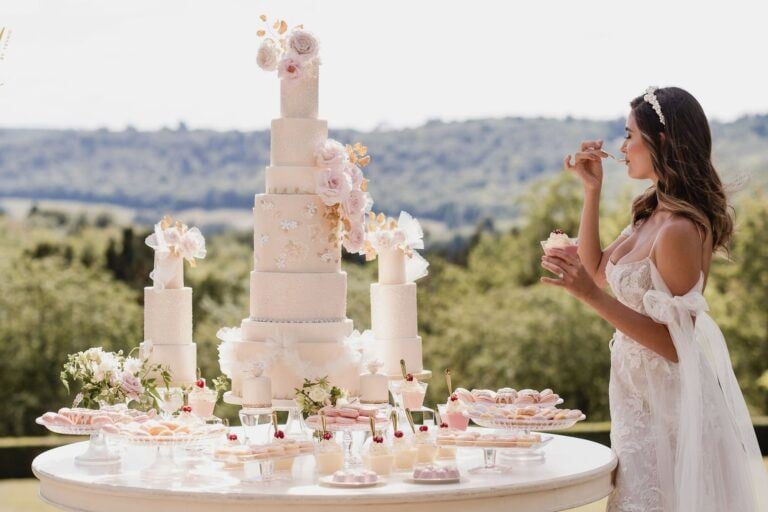
Your wedding cake is most likely the most expensive dessert you’ll ever buy, with the average cost at around £360. After all, it’s not just hugely symbolic: you’re paying for an edible work of art. Yet just like the cake itself, there are layers to the cost. The larger your wedding party, the bigger the cake will be, and the more expensive it will be too. If you do have a lot of guests, a cake with a less complex or intricate design will help keep costs down. You could also consider a dummy layer that replaces a layer of cake with polystyrene – not as tasty, but generally cheaper (though this isn’t always the case).
Due to the skill and time needed to make them, fondant and sugar flowers will typically cost more, so you can save money by forgoing them where possible. A lovely and cost-effective option (not to mention fashionable) is a naked cake with fresh flowers or fruit. Not only does a naked cake require less buttercream and fewer time-consuming decorations, but it still looks and tastes amazing.
Wedding cupcakes are another cute option and usually cost around £4 per guest; they’re generally easier to make and decorate, look adorable in pictures, and are often cheaper than a showstopping multi-tiered wedding cake.
For more tips, check out our post on how to save money on your wedding cake.
How can you save money on wedding entertainment and music?
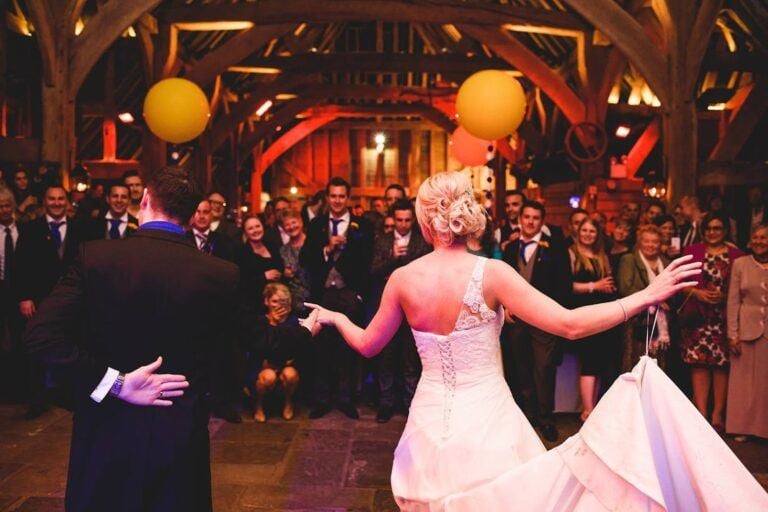
Wedding entertainment and music are a key part of keeping your guests entertained throughout the day, but with the average cost of entertainment coming in at £844 and the average cost of music at £1,906, they’re not cheap.
For entertainment, it ultimately depends on your wedding theme. To keep costs down, consider creating a DIY kid’s table if children are coming to your wedding. A collection of colouring books, crayons and a box of Lego will save you £500+ that you would have to spend on a kids’ entertainer.
When it comes to music, if you’re interested in a live act, unless you want Tylor Swift at your wedding, a solo singer will generally be far more affordable than a band, simply because you’re paying one performer instead of four or five. Similarly, a DJ is often a more budget-friendly option and is almost guaranteed to be a crowd-pleaser. You can actually save by choosing a DJ over a live band (though a band will offer that unique touch to your evening reception).
Check out our posts on how to save money on wedding entertainment and how to save money on wedding music for more money-saving tips.
How can you save money on your wedding dress?
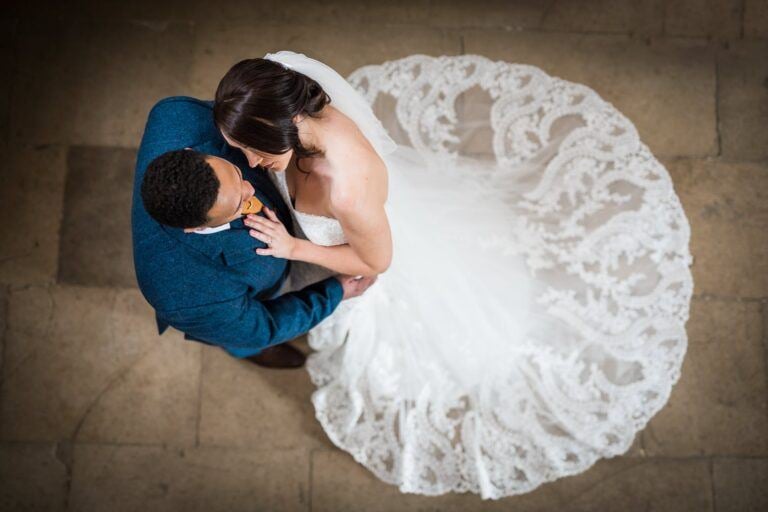
Many couples spend between £500 – £2,500 on a wedding dress, and that’s often before any accessories or alterations that complete the final ensemble. Making bridal shop appointments and trying on dresses is a momentous and exciting part of the planning process, but before you say yes to the dress, know that there are plenty of tips for saving money on your wedding dress.
Firstly, you can reach out to bridalwear boutiques and ask if they have any upcoming sales or bridal dresses at discounted prices. There’s every chance that in a week or two, there may be a sale that slashes the price of many of their dresses, saving you a bundle. And, it may be an awkward conversation, but asking your bridesmaids to pay for their own dresses could save you £300+.
Most bridal shops sell sample dresses in styles they’re either discontinuing or no longer want to sell at discounted prices. These are dresses you and other brides-to-be try on in the shops, but if you can look past this you can make significant savings. You can also opt for high-fashion brands – ASOS, Chi Chi London and Little Mistress all sell wedding dresses at super affordable prices (just note that these are unlikely to match the quality and service of a bridalwear boutique).
The amount of gorgeous second-hand dresses out there shouldn’t be underestimated, and you can save as much as £750 by finding a vintage or pre-loved dress. Plus, only 5% of brides buy a second-hand dress, which means you won’t face much competition if you opt for something pre-loved.
How can you save money on wedding accessories and wedding shoes?
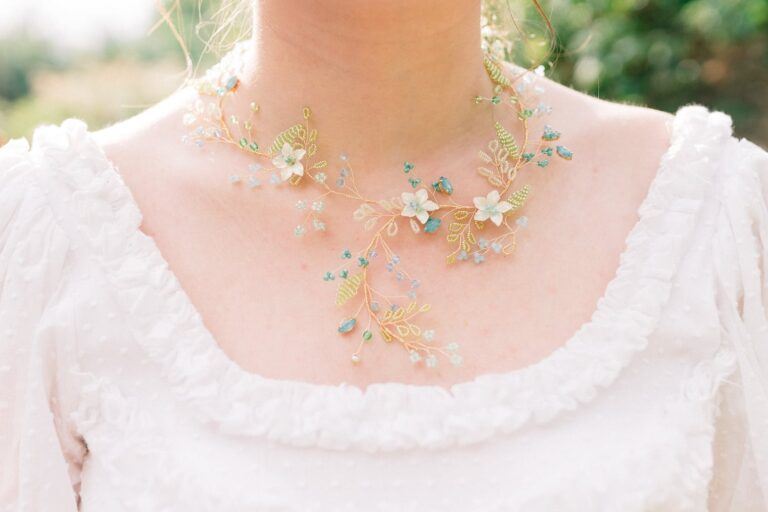
From beads to boutonnières, wedding accessories help to bring your outfits together and complement the style and theme of your wedding. However, wedding accessories aren’t cheap, with couples spending an average of £449.
To save money on a veil, why not have it as your ‘something borrowed’ and ask a family member if you could use theirs? If you’re willing to compromise, you may also have other accessories at home already, including a belt and bowtie, or jewellery and handbag, which may already work with your wedding outfit.
It’s also worth checking the depths of your shoe cupboard to see if you have some shoes that will work. Just remember to give them a polish to make them extra shiny. And remember that, again, you might have to compromise on the exact look and quality you originally envisioned . Check out our dedicated post to discover more ways to save money on wedding accessories.
How can you save money on wedding beauty?

The thought of walking down the aisle, all eyes on you, is both exciting and probably a little nerve-wracking. But, when you look amazing, it can help you feel confident enough to melt those nerves away. This is one of the many reasons why hiring a professional to take care of your hair and makeup is important to so many brides and, in most cases, totally worth it – that and it’s one less thing for you to worry about on the day. But, with couples spending an average of £811 on hair and makeup (as well as other pre-wedding rituals) cutting costs where possible can be a lifesaver for budget-conscious couples.
The most obvious way to significantly save money on wedding hair and makeup is by biting the bullet and doing it yourself, or asking your bridesmaids to take on the responsibility. This could save you up to £360+, but comes with its own set of risks (which we set out in our article on demystifying bridal beauty costs). If the DIY approach isn’t ideal, you could instead consider hiring a makeup assistant , who won’t be as experienced as a hair or makeup artist but will still have worked closely with one at plenty of weddings.
Another cost-saving option is to travel to your stylist or beautician on the morning of your wedding, rather than having them come to you at your venue. This could potentially halve the amount you spend on beauty. Just note that you won’t get the same level of on-the-day care and attention, including last-minute touch-ups and veil adjustments, which might be stressful).
How can you save money on a wedding suit?
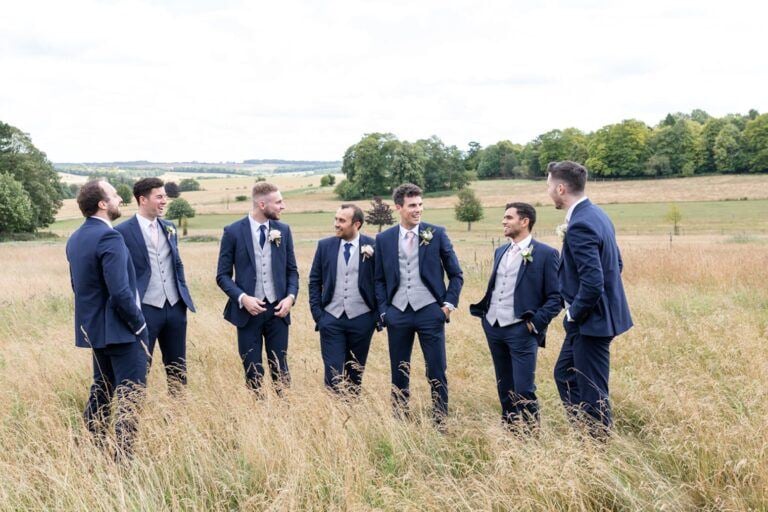
While not generally quite as pricey as a wedding dress, today’s couples spend an average of £859 on suits for their wedding. While a bespoke, tailored suit might be appealing, high-street retailers offer a great range of wedding suits for around £150 if you’re on a tight budget. You may also find a great suit or tuxedo at a local second-hand store or charity shop, but bear in mind you’ll likely need to have it altered to fit you perfectly (which will bump up the costs).
Another option to slash the price of a suit is through renting, which can cost as little as £50 per suit. Plus, if all the groomsmen rent their tuxes or suits from the same place, there’s a good chance the groom’s suit will be free, or at least discounted. And even if this isn’t an advertised offer, it’s always worth asking.
For more tips and tricks, check out our post on saving money on wedding suits.
How can you save money on wedding rings?
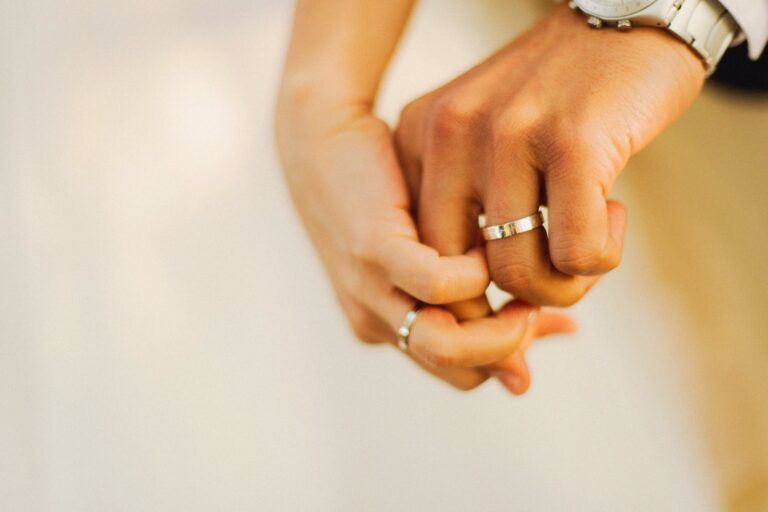
Your wedding ring is the one piece of jewellery you’ll rarely take off, so will be with you through thick and thin – which is why couples spend an average of £1,057 on their wedding rings. However, it is possible to save money on wedding rings by not relying on expensive metals such as gold and platinum, instead opting for something such as silver or titanium, which could lower the cost to as little as £50 per ring (and still be durable over years of wear and tear).
You may also want to seriously think about whether or not you want to choose wedding rings with set diamonds or other precious stones. While it may look incredible, it will be far more expensive than if you were to choose a plain band. Also, the thicker the band is, the more expensive it will be, so consider choosing a band that is on the thinner side to reduce the cost.
How can you save money on wedding invitations and stationery?
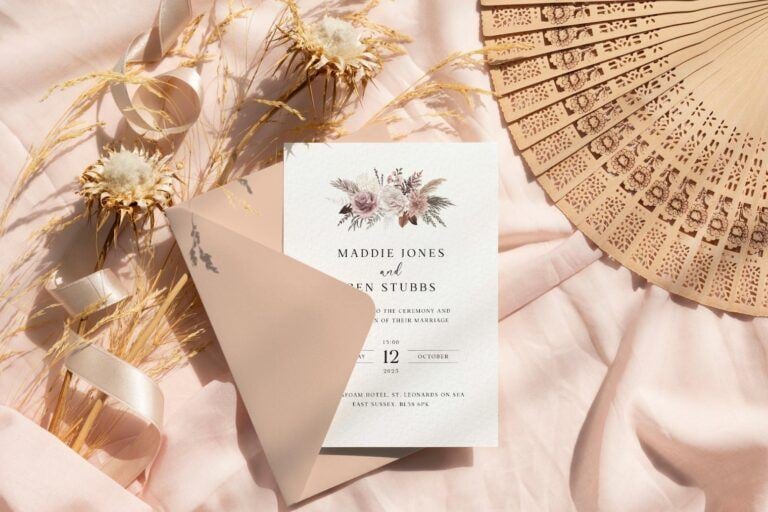
With Pinterest full of gorgeous and creative wedding invitation ideas, it’s hard to forgo a beautiful professionally-designed invitation in favour of a less aesthetic amateur one. But, you don’t necessarily have to do that to save money. Choose the invitation style of your dreams and go digital, and give your guests the option to RSVP digitally too. This will massively reduce the cost of your wedding stationery, on which couples spend an average of £378.
Almost a third of today’s couples don’t use paper stationery, such as menus and invitations, so consider joining them! Save money on wedding stationery by using sites like Paperless Post, or design your own beautiful digital invitations to email to your guests and save almost £300. At the wedding, a decorative chalkboard can explain the menu and agenda for the day – beautiful and often cheaper than paper (plus you can box it away as a keepsake post-wedding).
How can you save money on a registry office wedding?
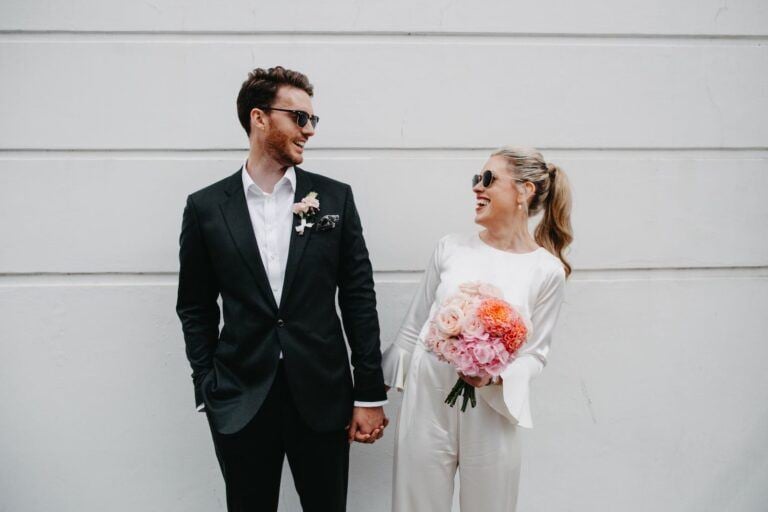
A registry office wedding is already one of the most affordable choices when it comes to a wedding on a budget, costing an average of £1,342. However, it’s possible to save even more money on a registry office wedding if you opt for the basic ceremony only, which means it could cost you as little as £57 (not including the £35 it costs for each of you to give notice).
It can also be cheaper to get married during quieter periods, so make sure you avoid peak times such as Saturday afternoons or the height of summer.
How can you save money on a wedding planner?
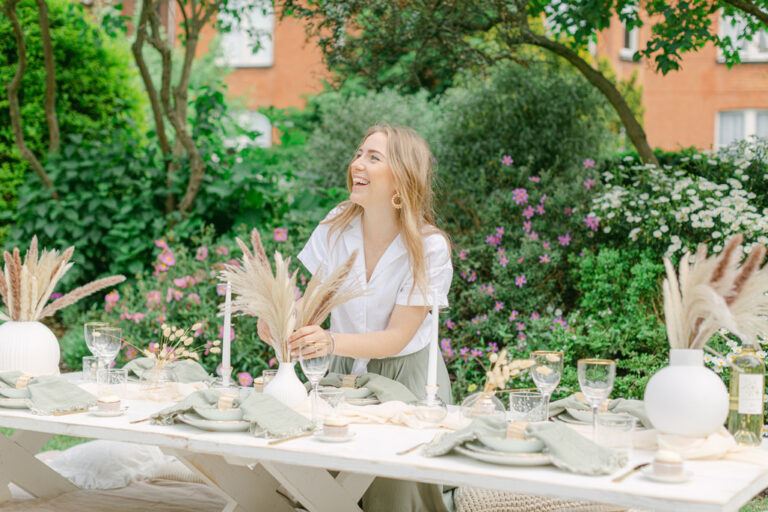
Hiring a wedding planner may sound like another cost you could do without – after all, the average cost of a wedding planner is £1,543, or about 7% of your overall budget. But, wedding planners can actually help you save money in the long run by ensuring you stay within your budget. Not only that, but being in the industry means that wedding planners also have plenty of contacts and connections and can help you land the best deals, discounts and savings as a result, and they’re expert negotiators as well.
One way to save money on a wedding planner is by hiring them to do a partial wedding planning service, which means they come in with a few months to go before your wedding to make sure everything is as it should be. It’s a far more affordable service, but obviously not as thorough as if you were to hire them at the very start of your planning journey.
To learn more, read our post on how to save money on a wedding planner.
How can you save money on a wedding celebrant?
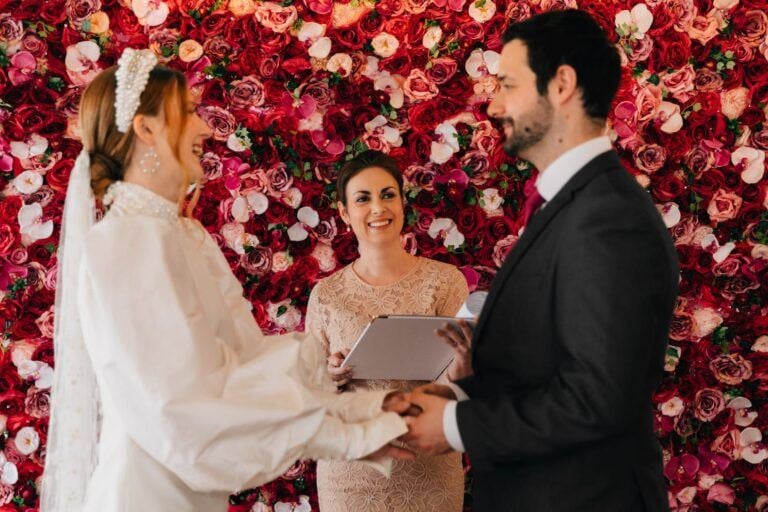
A wedding celebrant is a wonderful way to personalise your ceremony, particularly if you’re not looking for a religious wedding or you’re a couple with mixed faiths. However, because a celebrant can’t legally marry you, there are further costs due to the need to also hire a registrar. And, with the average cost of a celebrant being £504, this can be an important cost to consider.
To save money on a wedding celebrant, consider compromising on the level of service involved. Ask if they’ll consider not meeting with you ahead of the wedding, and if they’re happy to rely on a questionnaire to personalise your ceremony. Similarly, many celebrants will want to speak to your family and friends about your relationship; cutting out this service may help to lower the price. Just be aware that you may not get as bespoke or thorough a service.
How can you save money on wedding favours?
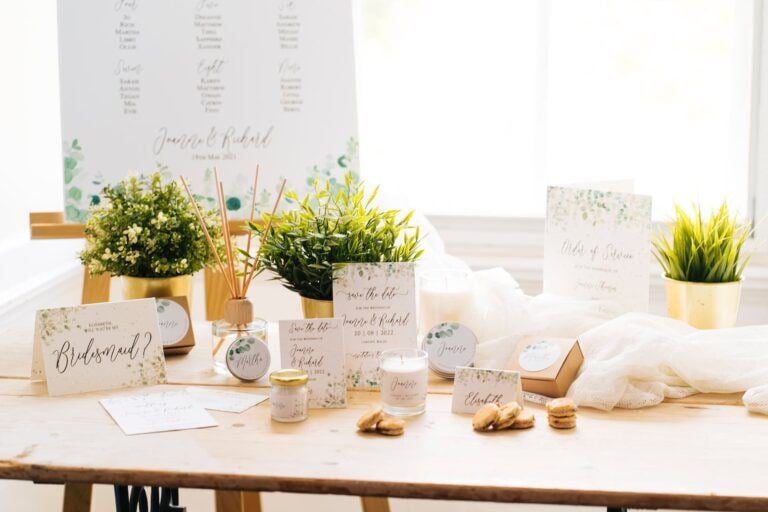
Wedding favours might not be the biggest expense of your wedding (the average amount couples spend on wedding favours is £144), but here are some money-saving tips to help keep those costs as low as possible:
- Go down the DIY route. DIY favours can really reduce your costs, and if you’re happy with them not being super personalised, you could get the cost down to less than £1 each.
- Consider cheap sweet treats. Edible favours are usually a more budget-friendly choice, such as retro sweets, biscuits, or even homemade jam.
- Keep packaging simple and practical. The simpler the design, the more affordable the packaging will generally be.
- Donate to a charity. A charity donation made on behalf of your guests allows you to control how much you spend, and makes for a thoughtful and generous gesture.
How can you save money on wedding transport?
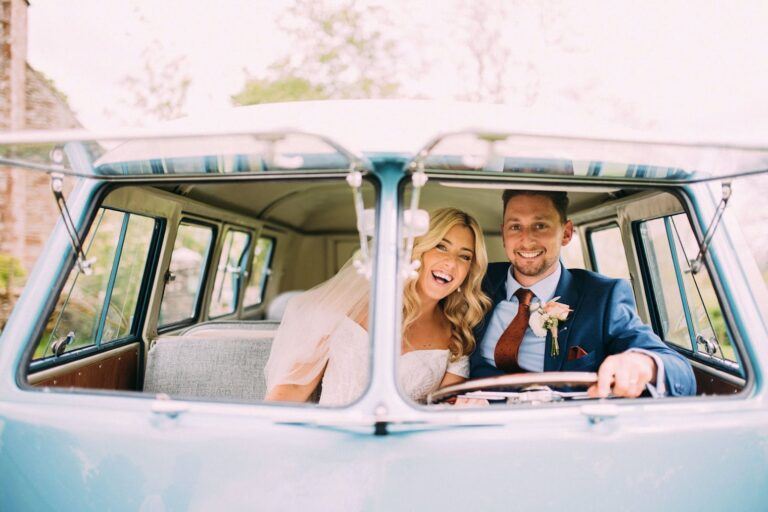
Depending on your plans, you could spend a good chunk of the first half of your wedding day being driven from A to B to C and back to B again. For that reason, wedding transport can be expensive, with couples spending an average of £593 on the vehicle and driver of their choice.
To save money on wedding transport, consider hiring a venue that allows you to have the ceremony, breakfast, reception and accommodation all in one, so you only need to pay for an hour or so of time. Or, if you know someone with a classic car or something with some oomph under the bonnet, call in a favour in exchange for an invite and a night of free drinks.
If you’re not particular about the type of vehicle, there are plenty of low-cost options available, including DS Executive Cars, Classic Bridal Cars and Kent and Coastal Wedding Cars, who all have costs as low as £100.
How can you save money on your honeymoon?

Your honeymoon is your chance to relax and unwind after a year or more of full-on wedding planning. The honeymoon is non-negotiable for many couples and is one of the biggest splurges, costing an average of £5,833.
It can be tempting to book your honeymoon early to help you budget, but if you’re flexible with where you’re happy to go, you could grab a bargain by booking a last-minute deal a week or two before your wedding.
But if you have your sights set on somewhere in particular, reduce costs by travelling on off-peak days: Wednesdays and Thursdays are usually the cheapest for international flights. It also goes without saying that during busier times, such as school holidays or the summer months, it’s often expensive to travel. If your wedding is booked on such an occasion, why not postpone your honeymoon by just a couple of weeks and save money by travelling off-peak?
For more tips, check out our post on how to save money on your honeymoon.
How can you save money on wedding insurance?
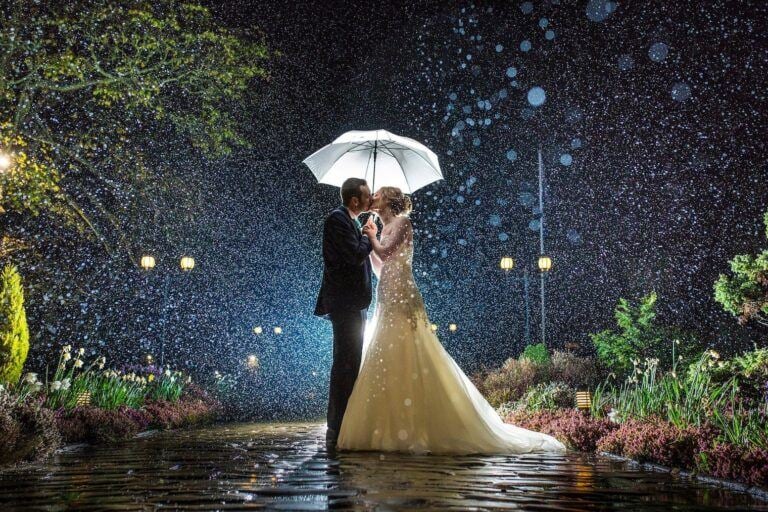
The cost of wedding insurance might feel like an unnecessary expense – as low as £30 for the most basic cover, to £100 -£180 on average, to up to £20,000 – but it can save you thousands down the line in the unlikely event something goes wrong.
You can save money on your wedding insurance by only choosing a basic policy, such as a policy which doesn’t include public liability. If you also forgo a marquee, you won’t need to add a marquee insurance extension to your policy, further bringing the cost right down.
Despite being a specialist type of insurance, comparison sites such as Money Supermarket let you compare quotes from various providers so you can secure the best policy. Just double-check that your chosen insurer includes everything you need and provides you with the right level of coverage.
How can you save money on wedding gifts?
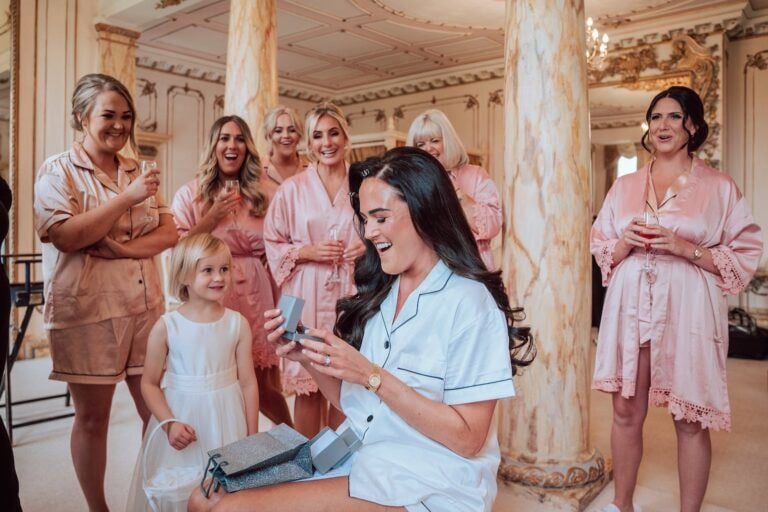
Spending the ‘right’ amount of money on a wedding gift is something that plagues the mind of many wedding guests, but the cost of a wedding gift can vary dramatically based on several factors, including your relationship with the couple and whether or not you’re in a couple yourself.
But, there are ways to save money on a wedding gift. Why not club together with other guests, turning what would be several smaller gifts into a single larger one?
If the couple has a gift registry, it should include gift suggestions to suit a range of budgets. Don’t buy your gift from the first retailer you find it in – if you shop around you might be able to find a bargain, or at the very least something very similar with a far more affordable price tag.
Plan your dream wedding with Bridebook
There you have our top tips to help you save money on your wedding. For more information, check out our individual savings pages for even more ways to cut down your spending and make your wedding budget go further.
Here at Bridebook, we have thousands of wedding venues and suppliers to suit any budget. Sign up today and start planning your dream wedding!
Browse other similar articles…
- The Ultimate Wedding Budget Breakdown
- The Average Cost of a UK Wedding in 2026 is £20,604
- Introduction: Your Wedding Budget
- Hidden Wedding Costs Every Couple Needs To Know About
- Wedding Etiquette: Who (Traditionally) Pays For What?
Happy Planning!

